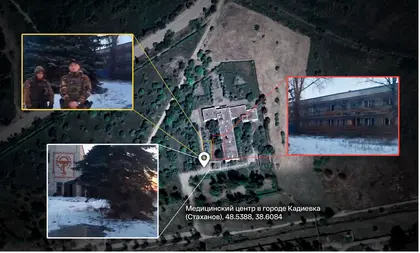A group of former fighters of the Wagner group, including some those who accepted the chance to sign contracts with the Russian Armed Forces following the June 2023 mutiny led by Yevgeny Prigozhin, were formed into a separate assault company. Their unit was assigned to the 331st Parachute Regiment, part of the 98th “Kostroma” Airborne Division and are currently stationed in the so-called Luhansk People’s Republic (LNR).
The 331st had been involved in fighting in the Donbas since 2014 and was one of the lead units for Russian President Vladimir Putin’s so-called “special military operation” in Ukraine.
JOIN US ON TELEGRAM
Follow our coverage of the war on the @Kyivpost_official.
The regiment is known to have suffered high casualty rates and was the subject of a special BBC report on how Russia had been hiding the true levels of those killed in the summer of 2022. As a result, the majority of its troops were now recent volunteers who struggled to live up to the Regiment’s “elite” reputation.
Pro-Russian “Z-blogger” Anastasia Kashevarova said on her Telegram channel on Thursday that the former mercenaries became aware that there was widespread drug use by troops of the 331st and were appalled when they found out that some of their own were using.
The Wagner unit commanders decided to find out who was responsible for “committing sabotage in wartime” and corrupting “the well-coordinated members” of their combat team. They decided to do something about it and conduct an “investigation” of their own.

Russian Strike Kills One, Injures 16 in Southern Ukraine
On Jan. 15, they conducted a controlled purchase which resulted in them catching three drug dealers red-handed. They interrogated the three dealers, and it transpired that one of them was a local traffic police officer. Kashevarova says the soldiers made videos of the questioning which included the three confessing that they were regular suppliers of drugs to the Regiment’s personnel.
However, on the night of Jan 15-16, before soldiers could report the issue to the authorities the police officer’s wife reported him as missing. It seems likely that the Luhansk police who arrived at the soldiers’ location were already aware of what was going on. When the police arrived, the soldiers handed the drug dealers over.
Kashevarova then goes on to say that the police left with their prisoners but immediately released the drug-dealing police officer and his two companions.
Shortly thereafter, she reports that a military investigative team made up of members of Russia’s Federal Security Service (FSB), the SOBR counter-terrorism force, and military police arrived on the scene and arrested six of the soldiers who had apprehended the drug traffickers.
Kashevarova said the soldiers were charged with kidnapping and drug possession (as they were still holding the drugs they had seized) and confirmed the three drug dealers had been released.
Another Russian milblogger, Romanov Light, took up the story and confirmed many of the details provided in Kashevarova’s post. In a later post Romanov suggested that the freed police officer had been working on behalf of other senior individuals in the so-called Luhansk People’s Republic (LNR) administration, without naming them.
Yet another pro-Kremlin milblogger, ГОЛОС МГБ (MGB Voice) went as far as to say that the detained traffic policeman was working for Evgeny Afanasov, deputy chief in the LNR’s Ministry of Internal Affairs and his close friend Alexander Makartsev, Head of State Traffic Safety Inspectorate (CSS) for the LNR. The blogger said that it was common knowledge that CSS employees are involved in drug trafficking and typically deliver their product through taxi drivers.
The blogger Крепкое слово (Strong voice) said that a member of the ex-Wagner company told him that the members of the team that were detained by the military investigation department were being held in solitary confinement which, according to the investigators, could last for at least a month. He said he was working with the soldiers to find legal representation.
The former Wagner fighters have posted a video message on YouTube telling their side of the story and saying they were expecting to be stormed by the SOBR and “special forces of the Ministry of Defense” in the near future because of the “anti-drug operation” they carried out.
The independent Russian news site, The Insider, geolocated the video and identified that it had been taken in the territory of a medical center in occupied Kadiivka (which was formerly known as Stakhanov before being renamed by Russia in 2016). The town is about 45 kilometers west of the Luhansk regional capital.

Kashevarova commented in her Telegram post that the arrest of the soldiers was not only illogical but in contravention of Russia’s own imposition of martial law in the occupied territories which entitled members of Russia’s Armed Forces to perform the following tasks: “suppress the activities of illegal armed groups, terrorist and sabotage activities, maintain public order and ensure public safety.”
She then raged against those who had “turned the law inside out by arresting the servicemen who had uncovered the distribution of narcotic drugs among military personnel” and demanded an investigation to “identify everyone whose activities undermine the defense and security of the Russian Federation.”
She went on to say that “lawlessness, corruption, sabotage and betrayal of one's country must be strictly suppressed.”
She said she had passed all the information and material including videos she held to the Ministry of Defense in Moscow in the hope that they “will stand up for its guys and defend those who had done the right thing.”
You can also highlight the text and press Ctrl + Enter










